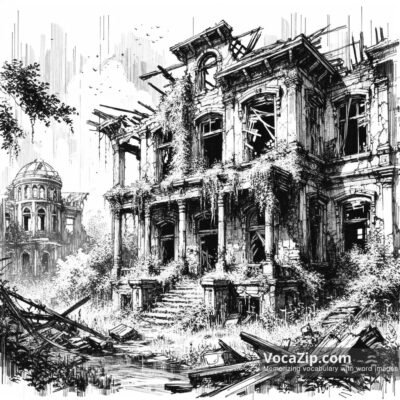ruin meaning
ruin :
destruction, devastation
noun
▪ The hurricane caused extensive ruin in the city.
▪ The hurricane caused large-scale destruction in the city.
▪ The ancient ruins attract many tourists.
▪ The old remains attract many visitors.
paraphrasing
▪ devastation – destruction
▪ collapse – breakdown
▪ spoil – make unusable
▪ wreck – cause severe damage

ruin :
destroy, damage
verb
▪ The fire ruined the old library.
▪ The fire destroyed the old library.
▪ Bad weather can ruin crops.
▪ Bad weather can damage crops.
paraphrasing
▪ damage – harm
▪ destroy – completely ruin
Pronunciation
ruin [ˈruː.ɪn]
The stress is on the first syllable 'ruin' and sounds like 'roo-in'.
Common phrases and grammar about ruin
ruin - Common meaning
noun
destruction, devastation
verb
destroy, damage
Part of Speech Changes for "ruin"
▪ ruined (adjective) – destroyed or damaged
▪ ruins (plural noun) – remains of destroyed buildings
Common Expressions with "ruin"
▪ ruin the plans – destroy the plans
▪ ruin a reputation – damage someone's good name
▪ ruin the economy – destroy the economy
▪ ruin the environment – damage the environment
Important examples of ruin in TOEIC
Vocabulary examples from the TOEIC test
In TOEIC vocabulary questions, ruin as a noun refers to extensive damage or destruction. As a verb, it means to damage or destroy something.
Example of a confusing word: run (to operate or manage)
Grammar examples from the TOEIC test
When used as a verb, ruin often appears in grammar questions focusing on sentence structure and verb usage.
ruin
Idioms and fixed expressions in TOEIC
economic ruin
'financial destruction', used when talking about the collapse of an economy.
go to ruin
means 'to become destroyed or damaged' used when something deteriorates over time.
Differences between similar words and ruin
ruin
,
destroy
differences
ruin is often used for causing general damage or destruction, while destroy implies complete annihilation.
ruin
,
demolish – destroy completely
differences
ruin means to cause damage, while demolish means to destroy something completely, often physically.
Words with the same origin as ruin
The origin of ruin
The word 'ruin' comes from the Latin 'ruina', meaning 'collapse' or 'fall'.
Word structure
It has the root 'ruin' with no prefix or suffix, meaning 'collapse'.
Words with the same origin
The root of ruin is 'ruin'. Words with the same root include 'ruination'.






